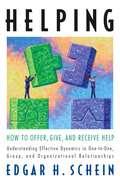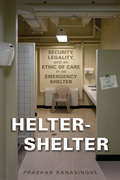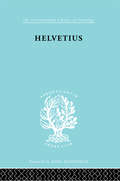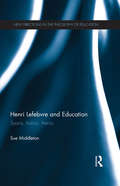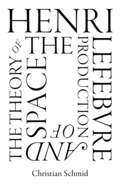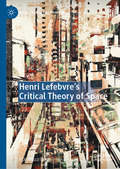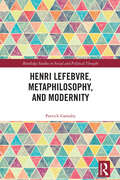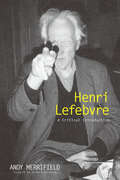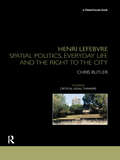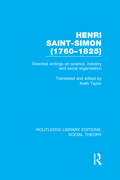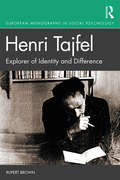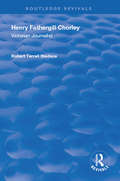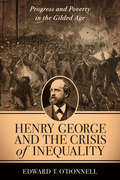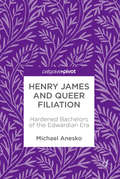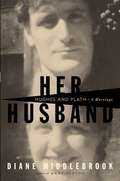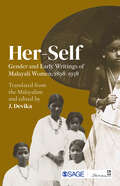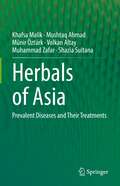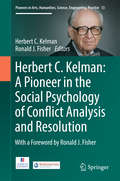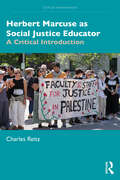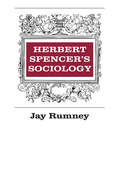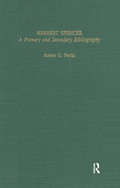- Table View
- List View
Helping: How to Offer, Give, and Receive Help (The Humble Leadership Series)
by Edgar ScheinBy the bestselling author of Career Anchors (over 431,000 copies sold) and Organizational Culture and Leadership (over 153,000 sold) • A penetrating analysis of the psychological and social dynamics of helping relationships • Named one of the best leadership books of 2009 by strategy+business magazine Helping is a fundamental human activity, but it can also be a frustrating one. All too often, to our bewilderment, our sincere offers of help are resented, resisted, or refused—and we often react the same way when people try to help us. Why is it so difficult to provide or accept help? How can we make the whole process easier? Many different words are used for helping: assisting, aiding, advising, caregiving, coaching, consulting, counseling, guiding, mentoring, supporting, teaching, and many more. In this seminal book on the topic, corporate culture and organizational development guru Ed Schein analyzes the social and psychological dynamics common to all types of helping relationships, explains why help is often not helpful, and shows what any would-be helpers must do to ensure that their assistance is both welcomed and genuinely useful. The moment of asking for and offering help is a delicate and complex one, fraught with inequities and ambiguities. Schein helps us navigate that moment so we avoid potential pitfalls, mitigate power imbalances, and establish a solid foundation of trust. He identifies three roles a helper can play, explaining which one is nearly always the best starting point if we are to provide truly effective help. So that readers can determine exactly what kind of help is needed, he describes an inquiry process that puts the helper and the client on an equal footing, encouraging the client to open up and engage and giving the helper much better information to work with. And he shows how these techniques can be applied to teamwork and to organizational leadership. Illustrated with examples from many types of relationships—husbands and wives, doctors and patients, consultants and clients—Helping is a concise, definitive analysis of what it takes to establish successful, mutually satisfying helping relationships.
Helter-Shelter: Security, Legality, and an Ethic of Care in an Emergency Shelter
by Prashan RanasingheHelter-Shelter is an ethnographic account of the manner in which an emergency shelter is governed on a daily basis, from the perspective of the personnel who are employed and tasked with providing care. Prashan Ranasinghe focuses on how the founding ethos of the shelter, an ethic of care, is conceptualized and practiced by examining its successes and failures. Ranasinghe reveals how this logic is diluted and adulterated because of two other important logics, security and legality, which, working alongside, take precedence and trump the import of care. The care that is deployed is heavily legalized and securitized and it is also administered inconsistently and idiosyncratically. As a result, disorder and confusion pervade the shelter. Helter-Shelter offers a unique perspective on the delivery of care, and how this laudable intention faces such daunting challenges.
Helvetius: His Life and Place in the History of Educational Thought (International Library of Sociology #Vol. 229)
by Ian CummingPublished in 1998, Helvetius is a valuable contribution to the field of Sociology and Social Policy.
Henri Lefebvre and Education: Space, history, theory (New Directions in the Philosophy of Education)
by Sue MiddletonDuring his lifetime Henri Lefebvre (1901-1991) was renowned in France as a philosopher, sociologist and activist. Although he published more than 70 books, few were available in English until The Production of Space was translated in 1991. While this work - often associated with geography - has influenced educational theory’s ‘spatial turn,’ educationalists have yet to consider Lefebvre’s work more broadly. This book engages in an educational reading of the selection of Lefebvre’s work that is available in English translation. After introducing Lefebvre’s life and works, the book experiments with his concepts and methods in a series of five ‘spatial histories’ of educational theories. In addition to The Production of Space, these studies develop themes from Lefebvre’s other translated works: Rhythmanalysis, The Explosion, the three volumes of Critique of Everyday Life and a range of his writings on cities, Marxism, technology and the bureaucratic state. In the course of these inquiries, Lefebvre’s own passionate interest in education is uncovered: his critiques of bureaucratised schooling and universities, the analytic concepts he devised to study educational phenomena, and his educational methods. Throughout the book Middleton demonstrates how Lefebvre’s conceptual and methodological tools can enhance the understanding of the spatiotemporal location of educational philosophy and theory. Bridging disciplinary divides, it will be key reading for researchers and academics studying the philosophy, sociology and history of education, as well as those working in fields beyond education including geography, history, cultural studies and sociology.
Henri Lefebvre and the Theory of the Production of Space
by Christian SchmidHenri Lefebvre&’s was the major theorist of space and of the urban. This is the definitive book on Lefebvre.This book presents an encompassing, detailed and thorough overview and reconstruction of Lefebvre&’s theory of space and of the urban.Henri Lefebvre belongs to the generation of the great French intellectuals and philosophers, together with his contemporaries Michel Foucault and Jean-Paul Sartre. His theory has experienced a remarkable revival over the last two decades, and is discussed and applied today in many disciplines in humanities and social sciences, particularly in urban studies, geography, urban sociology, urban anthropology, architecture and planning. Lefebvre, together with David Harvey, is one of the leading and most read theoreticians in these fields.This book explains in an accessible way the theoretical and epistemological context of this work in French philosophy and in the German dialectic (Hegel, Marx, and Nietzsche), and reconstructs in detail the historical development of its different elements. It also gives an overview on the receptions of Lefebvre and discusses a wide range of applications of this theory in many research fields, such as urban and regional development, urbanization, urbanity, social space, and everyday life.
Henri Lefebvre on Space: Architecture, Urban Research, and the Production of Theory
by Łukasz StanekIn this innovative work, Lukasz Stanek frames a uniquely contextual appreciation of Henri Lefebvre&’s idea that space is a social product. Stanek explicitly confronts both the philosophical and the empirical foundations of Lefebvre&’s oeuvre, especially his direct involvement in the fields of urban development, planning, and architecture. Countering the prevailing view, which reduces Lefebvre&’s theory of space to a projection of his philosophical positions, Stanek argues that Lefebvre&’s work grew out of his concrete, empirical engagement with everyday practices of dwelling in postwar France and his exchanges with architects and planners. Stanek focuses on the interaction between architecture, urbanism, sociology, and philosophy that occurred in France in the 1960s and 1970s, which was marked by a shift in the processes of urbanization at all scales, from the neighborhood to the global level. Lefebvre&’s thinking was central to this encounter, which informed both his theory of space and the concept of urbanization becoming global. Stanek offers a deeper and clearer understanding of Lefebvre&’s thought and its implications for the present day. At a time when cities are increasingly important to our political, spatial, and architectural world, this reassessment proposes a new empirical, and practical, interpretation of Lefebvre&’s ideas on urbanism.
Henri Lefebvre's Critical Theory of Space (Marx, Engels, and Marxisms)
by Francesco BiagiHenri Lefebvre's Critical Theory of Space offers a rigorous analysis and revival of Lefebvre’s works and the context in which he produced them. Biagi traces the historical-critical time-frame of Lefebvre's intellectual investigations, bringing to light a theoretical constellation in which historical methods intersect with philosophical and sociological issues: from Marxist political philosophy to the birth of urban sociology; from rural studies to urban and everyday life studies in the context of capitalism. Examining Lefebvre’s extended investigations into the urban sphere as well as highlighting his goal of developing a “general political theory of space” and of innovating Marxist thought, and clarifying the various (more or less accurate) meanings attributed to Lefebvre's concept of the “right to the city” (analysed in the context of the French and international sociological and philosophical-political debate), Henri Lefebvre's Critical Theory of Space ultimately brings the contours of Lefebvre’s innovative perspective—itself developed at the end of the “short twentieth century”—back into view in all its richness and complexity.
Henri Lefebvre, Metaphilosophy, and Modernity (Routledge Studies in Social and Political Thought)
by Patrick GamsbyHenri Lefebvre, Metaphilosophy, and Modernity provides a new interpretation of the work of Henri Lefebvre (1901–1991), reframing it as being above all a metaphilosophy of modernity.Henri Lefebvre is increasingly being recognized as one of the great twentieth-century thinkers. Nevertheless, the majority of scholarship on Lefebvre predominantly focuses on his theorizing of space, often taking Lefebvre’s The Production of Space as the point of departure, and/or on his theorizing of everyday life, with his multi-volume Critique of Everyday Life as the focal point. This book argues that it is Lefebvre’s concept of metaphilosophy that provides the connective tissues for these works, one that is chiefly concerned with deciphering the enigma of modernity.The book will appeal to a wide interdisciplinary and international audience from the fields of sociology, philosophy, cultural studies, geography, the history of ideas, and literary studies. This includes scholars and students interested in Henri Lefebvre’s writings, everyday life, modernity, space/time, leisure/work, continental thought, critical theory, Marxism, and technology.
Henri Lefebvre: A Critical Introduction
by Andrew MerrifieldPhilosopher, sociologist and urban theorist, Henri Lefebvre is one of the great social theorists of the twentieth century. This accessible and innovative introduction to the work of Lefebvre combines biography and theory in a critical assessment of the dynamics of Lefebvre's character, thought, and times. Exploring key Lefebvrian concepts, Andy Merrifield demonstrates the evolution of Lefebvre's philosophy, while stressing the way his long and adventurous life of ideas and political engagement live on as an enduring and inspiring interrelated whole.
Henri Lefebvre: Spatial Politics, Everyday Life and the Right to the City (Nomikoi: Critical Legal Thinkers)
by Chris ButlerWhile certain aspects of Henri Lefebvre’s writings have been examined extensively within the disciplines of geography, social theory, urban planning and cultural studies, there has been no comprehensive consideration of his work within legal studies. Henri Lefebvre: Spatial Politics, Everyday Life and the Right to the City provides the first serious analysis of the relevance and importance of this significant thinker for the study of law and state power. Introducing Lefebvre to a legal audience, this book identifies the central themes that run through his work, including his unorthodox, humanist approach to Marxist theory, his sociological and methodological contributions to the study of everyday life and his theory of the production of space. These elements of Lefebvre’s thought are explored through detailed investigations of the relationships between law, legal form and processes of abstraction; the spatial dimensions of neoliberal configurations of state power; the political and aesthetic aspects of the administrative ordering of everyday life; and the ‘right to the city’ as the basis for asserting new forms of spatial citizenship. Chris Butler argues that Lefebvre’s theoretical categories suggest a way for critical legal scholars to conceptualise law and state power as continually shaped by political struggles over the inhabitance of space. This book is a vital resource for students and researchers in law, sociology, geography and politics, and all readers interested in the application of Lefebvre’s social theory to specific legal and political contexts.
Henri Saint-Simon,: Selected Writings on Science, Industry and Social Organisation (Routledge Library Editions: Social Theory Ser.)
by Keith TaylorKeith Taylor has undertaken a thorough study of the full range of writings by the brilliant French thinker Henri Saint-Simon (1760–1825), including his unpublished manuscripts, and the result is the first comprehensive and truly representative selection in English from the works of this founding father of social science and socialism, whose ideas exerted a formative influence on such major and diverse intellectual figures as Comte, Proudhon, Marx and Engels, Herzen, Carlyle and Durkheim. When Saint-Simon's writings first appeared, they aroused little more than amusement and curiosity. The ideas they contained – ideas concerning the application of scientific method to the study of man and society, the coming of the new 'scientific-industrial' age in which the State would assume responsibility for promoting social welfare, the prospects for international cooperation and integration in Europe, man's need for a secular religion – were widely dismissed. But the boldness and originality of Saint-Simon's work had a lasting impact on subsequent thinkers and played a major role in the development of European social thought throughout the nineteenth and into the twentieth centuries.Keith Taylor's introductory essay places Saint-Simon's writings in their proper historical context, offers a penetrating reassessment of their significance as a contribution to social theory, and considers the extent of their influence on modern thought. It indicates the inadequacies of many previous interpretations of Saint-Simon's thinking, and highlights, in particular, the tendency of most recent commentators to disregard some crucial features of his political philosophy. This selection is an essential insight into a modern understanding of Saint-Simon from a young English scholar. Nowhere else in English may be found so wide-ranging a selection from Saint-Simon's writings presenting such a balanced view of his thought.
Henri Tajfel: Explorer of Identity and Difference (European Monographs in Social Psychology)
by Rupert BrownThis book offers a biographical account of Henri Tajfel, one of the most influential European social psychologists of the twentieth century, offering unique insights into his ground-breaking work in the areas of social perception, social identity and intergroup relations. The author, Rupert Brown, paints a vivid and personal portrait of Tajfel’s life, his academic career and its significance to social psychology, and the key ideas he developed. It traces Tajfel’s life from his birth in Poland just after the end of World War I, his time as a prisoner-of-war in World War II, his work with Jewish orphans and other displaced persons after that war, and thence to his short but glittering academic career as a social psychologist. Based on a range of sources including interviews, archival material, correspondence, photographs, and scholarly output, Brown expertly weaves together Tajfel’s personal narrative with his evolving intellectual interests and major scientific discoveries. Following a chronological structure with each chapter dedicated to a significant transition period in Tajfel’s life, the book ends with an appraisal of two of his principal posthumous legacies: the European Association of Social Psychology, a project always close to Tajfel’s heart and for which he worked tirelessly; and the 'social identity approach' to social psychology initiated by Tajfel over forty years ago and now one of the discipline’s most important perspectives. This is fascinating reading for students, established scholars, and anyone interested in social psychology and the life and lasting contribution of this celebrated scholar.
Henry Fothergill Chorley: A Victorian Artist (Routledge Revivals)
by Robert Terrell BledsoeFirst published in 1998, this book focuses on the once celebrated but now neglected musical journalism of Henry Forthergill Chorley. For nearly forty years he effectively used his acerbic pen and idiosyncratic critical judgments to celebrate the works of Rossini, Mendelssohn, Meyerbeer, Gounod and Sullivan, and to scorn those of Schumann , Verdi and Wagner. This book also discusses his friendships with literary figures such as Charles Dickens, Elizabeth Barrett Browning, and Felicia Hemans, as well as his ongoing efforts to establish himself as a novelist as well as a journalist.
Henry George and the Crisis of Inequality
by Edward O'DonnellThe remarkable explosion of American industrial output and national wealth at the end of the nineteenth century was matched by a troubling rise in poverty and worker unrest. As politicians and intellectuals fought over who to blame for this crisis, Henry George (1839--1897) published Progress and Poverty (1879), a radical critique of laissez-faire capitalism and its threat to the nation's republican traditions. His book, which became a surprise best-seller, offered a popular, provocative solution: a single-tax on land values. George's writings and years of social activism almost won him the mayor's seat in New York City in 1886. Though he lost the election, his ideas proved instrumental to shaping a progressivism that remains essential to tackling inequality today.Edward T. O'Donnell's exploration of George's life and times merges labor, ethnic, intellectual, and political history to illuminate the early militant labor movement in Gilded Age New York. O'Donnell locates in George's rise to prominence the beginning of a larger effort by American workers to regain control of the workplace and obtain economic security. The Gilded Age was the first but by no means last period in which Americans confronted the mixed outcomes of modern capitalism. George's accessible, forward-thinking ideas on democracy, equality, and freedom have tremendous value to ongoing debates over the future of unions, corporate power, Wall Street recklessness, regulation, and political polarization.
Henry George and the Crisis of Inequality: Progress and Poverty in the Gilded Age (Columbia History of Urban Life)
by Edward O'DonnellAmerica's remarkable explosion of industrial output and national wealth at the end of the nineteenth century was matched by a troubling rise in poverty and worker unrest. As politicians and intellectuals fought over the causes of this crisis, Henry George (1839–1897) published a radical critique of laissez-faire capitalism and its threat to the nation's republican traditions. Progress and Poverty (1879), which became a surprise best-seller, offered a provocative solution for preserving these traditions while preventing the amassing of wealth in the hands of the few: a single tax on land values. George's writings and years of social activism almost won him the mayor's seat in New York City in 1886. Though he lost the election, his ideas proved instrumental to shaping a popular progressivism that remains essential to tackling inequality today.Edward T. O'Donnell's exploration of George's life and times merges labor, ethnic, intellectual, and political history to illuminate the early militant labor movement in New York during the Gilded Age. He locates in George's rise to prominence the beginning of a larger effort by American workers to regain control of the workplace and obtain economic security and opportunity. The Gilded Age was the first but by no means the last era in which Americans confronted the mixed outcomes of modern capitalism. George's accessible, forward-thinking ideas on democracy, equality, and freedom have tremendous value for contemporary debates over the future of unions, corporate power, Wall Street recklessness, government regulation, and political polarization.
Henry James and Queer Filiation: Hardened Bachelors Of The Edwardian Era
by Michael AneskoThis study challenges the notion that closeted secrecy was a necessary part of social life for gay men living in the shadow of the trial and imprisonment of Oscar Wilde. It reconstructs a surprisingly open network of queer filiation in which Henry James occupied a central place. The lives of its satellite figures — most now forgotten or unknown — offer even more suggestive evidence of some of the countervailing forms of social practice that could survive even in that hostile era. If these men enjoyed such exemption largely because of the prerogatives of class privilege, their relative freedom was nevertheless a visible rebuke to the reductive stereotypes of homosexuality that circulated and were reinforced in the culture of the period. This book will be of particular interest to scholars of Henry James and queer studies, readers of late Victorian and modern literature, and those interested in the history and social construction of gender roles.
Her Husband: Hughes and Plath -- A Marriage
by Diane MiddlebrookTed Hughes married Sylvia Plath in 1956, at the outset of their brilliant careers. Plath's suicide six and a half years later, for which many held Hughes accountable, changed his life, his closest relationships, his standing in the literary world, and the style and substance of his verse. In this stunning new biography of their marriage, Diane Middlebrook presents a portrait of Hughes as a man, as a poet, and as a husband haunted--and nourished--his entire life by the aftermath of his first marriage. Drawing on a trove of newly available papers Middlebrook presents Hughes as a complicated, conflicted figure: sexually magnetic, fiercely ambitious, immensely caring, and shrewd in business. She argues that Plath's suicide, though it devastated Hughes and made him vulnerable to the savage attacks of Plath's growing readership, ultimately gave him his true subject--how marriages fail and how men fail in marriage. Writing with the penetrating insight and lucid sympathy that informed her previous bestselling biographies, Middlebrook rises to the multiple challenges presented by this highly fraught, deeply controversial subject. Her Husband is a triumph of the biographer's art and craft.
Her-Self: Gender and Early Writings of Malayali Women, 1898–1938
by J. Devika‘Texts that Dazzle.’ V. Geetha, Foreword Translated for the first time into English, these 29 pieces of early writings of Malayali women (1898–1938)—Nambutiris, Nairs, Ezhavas, Syrian Christians and two Muslims—who had access to education, reveal the vigorous debate over modern gender relations that was taking place. Women reflected on what was ‘Womanly’ and on education, duties, vocation and civil roles—an ongoing discussion, first influenced by reformism and later by nationalist and communist ideas. In her new Preface for this reprint, author talks of how the collection offers many genealogies for Malayali feminism, making it both local and cosmopolitan. Indeed, this genealogy enables us to address many of the challenges that mainstream feminism in India now faces, for example, that of developing intersectional analyses of patriarchal oppression. Taken together, these pieces are efforts to define, in their unique ways, ‘women’s perspectives’ as specifically oppositional standpoints. Many are replies, rejoinders and responses to male public figures who claimed to speak on behalf of a ‘general good’, especially of women.
Herausforderungen der Individualisierung
by Nikolai GenovDieses Buch setzt sich kritisch mit einer Reihe von provokanten Fragen auseinander: Warum sind die heutigen Gesellschaften so abhängig von den konstruktiven und destruktiven Auswirkungen der Individualisierung? Ist dieses Phänomen nur mit der "zweiten" oder "späten" Moderne verbunden? Kann das Konzept der Individualisierung produktiv für die Entwicklung einer soziologischen Diagnose unserer Zeit genutzt werden? Die innovativen Antworten, die in diesem Buch vorgeschlagen werden, konzentrieren sich auf zwei Arten von Herausforderungen, die den Anstieg der Individualisierung begleiten. Erstens, dass sie durch umstrittene Veränderungen in den sozialen Strukturen und Handlungsmustern verursacht wird. Zweitens, dass die Auswirkungen der Individualisierung Varianten des Gemeinwohls in Frage stellen. Beide Herausforderungen haben eine lange Geschichte, haben aber in den fortgeschrittenen Gesellschaften der Gegenwart im Kontext der aktuellen Globalisierung eine kritische Intensität erreicht.
Herausforderungen und Strategien der Personalberatung und Personalbetreuung: Aus der wirtschaftspsychologischen Praxis, für die Praxis
by Heribert WienkampPersonalmanagement bedeutet im Kern die Betreuung von Führungskräften und Mitarbeitenden und ist eine hochpolitische kommunikative Aufgabe. Zu Recht hat die Personalbetreuung den Ruf eines „Communication Champions“, da sie erster Ansprechpartner in allen beratungsrelevanten Personalfragen ist.Gemeinsam mit den Führungskräften übt der Personalbereich in der Funktion des Arbeitgebers das Direktionsrecht gegenüber den Betriebsangehörigen aus und kooperiert mit ihnen in allen Personalangelegenheiten. Personalentscheidungen dieser Akteure sind zumeist ambivalent mit pro und contra und stets Richtungsentscheidungen, die i.d.R. nicht revidierbar sind. Bei welchen Problemen und Schwierigkeiten die Personalberatung und Personalbetreuung gefordert ist und welchen konzeptionellen Input sie an wirtschaftspsychologischen und personalspezifischen Wissen leisten muss, erfahren Sie in diesem Buch. Hiervon ist nicht nur das tägliche Personalgeschäft betroffen, sondern auch die Gestaltung strategischerPersonalbetreuungskonzepte, die zu Inspirationen im Personalmanagement anregen.
Herbals of Asia: Prevalent Diseases and Their Treatments
by Mushtaq Ahmad Muhammad Zafar Münir Öztürk Volkan Altay Shazia Sultana Khafsa MalikMedicinal flora plays an important role in health care systems across the world. Out of the half million flowering plants, around 50.000 species are valued for their therapeutic properties. During the last few decades, 20% of the world’s population used plants and/or their derived products as a source of medicine. WHO stated that 80% population around the globe, specifically the rural communities, depend on medicinal plants for their basic healthcare needs. To this end, plant-based phytochemicals are known to have hepato-protective, anti-carcinogenic, anti-allergic, anti-inflammatory, antimicrobial, antioxidant actions. This book is a guide to ~280 plant species of medicinal flora that demonstrates global relevance. Our goal is to share local knowledge about phytomedicines to a worldwide audience. It is an illustrated reference that documents and preserves the existing knowledge on these plant taxa, with a social and cultural (ethnobotanical) emphasis. This book also provides comprehensive and useful information about traditional uses of medicinal plants by the local communities for the treatment of various prevalent diseases. It contains comprehensive descriptions of each species including family, synonyms, English name, distribution, altitude, habitat, morphological description, life form, part used, mode of utilization, diseases category, recipes, other medicinal uses, phytochemical activity and toxicity.
Herbert C. Kelman: A Pioneer in the Social Psychology of Conflict Analysis and Resolution
by Herbert C. Kelman Ronald J. FisherThis edited volume presents selected papers capturing Herbert Kelman's unique and seminal contributions to the social psychology of conflict analysis and resolution, with a special emphasis on the utility of concepts for understanding and constructively addressing violent and intractable conflicts. Central concepts covered include perceptual processes, basic human needs, group and normative processes, social identity, and intergroup trust, which form the basis for developing interactive methods of conflict resolution.
Herbert Marcuse as Social Justice Educator: A Critical Introduction (Critical Interventions)
by Charles ReitzDemonstrating the continued relevance of Marcuse’s work, Herbert Marcuse as Social Justice Educator details how his teachings remain a countervailing force to the conventional wisdom in intellectual and political matters today.By drawing on Marcuse’s critical analysis of the political economy, a profound concern for environmental issues, and an explicit critique of educational philosophy, this book illuminates not only the content and contours of Marcuse’s work but its importance for developing critical social scientific thinking and theoretical insight into contemporary issues such as genocide and ecocide, fascism and democratic crises, political economy and social inequality, and the role of culture and media in forming compliant consumer-citizens.From Charles Reitz, a prominent leader in Marcuse studies, this book will be an essential guide for instructors, students, and learners in sociology, social theory, political science, and environmental studies.
Herbert Spencer's Sociology
by Jay RumneyThe republication of this book is eminently fitting at this time. Jay Rumney's Herbert Spencer's Sociology first appeared in 1937. In that year Talcott Parsons, citing Crane Brinton, declared: "Spencer is dead. But who killed him and how?" It was the thesis of Parsons' famous The Structure of Social Action that the evolution of scientific theory had put an end to Spencer. For more than a generation the man whose name had been synonymous with sociology was, or so it seemed, repressed and forgotten.
Herbert Spencer: A Primary and Secondary Bibliography
by Robert G. PerrinFirst published in 1993. Routledge is an imprint of Taylor & Francis, an informa company.
